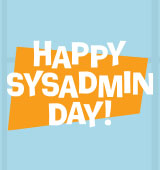 If you’re reading this on the internet, your PC is secure, without a virus and you can check your e-mail every few minutes, your sysadmin has done his job. Together with the rest of the IT department they make sure that everything’s running smoothly. Unfortunately the only time we realise how important their work is when something does NOT work.
If you’re reading this on the internet, your PC is secure, without a virus and you can check your e-mail every few minutes, your sysadmin has done his job. Together with the rest of the IT department they make sure that everything’s running smoothly. Unfortunately the only time we realise how important their work is when something does NOT work.
Every year on July 31 it’s the annual System Administrator Appreciation Day when system administrators are recognised for the work they do behind the screens to keep companies up and running.
So what does a sysadmin do exactly? According to http://sysadminday.com/ –
System administrators are always on call, whether it’s updating your company’s antivirus software or repairing a corrupt SQL database. Here’s a bunch of other tasks they do:
- A sysadmin unpacked the server for this website from its box, installed an operating system, patched it for security, made sure the power and air conditioner were working in the server room, monitored it for stability, set up the software, and kept backups in case anything went wrong. .
- When your network connection is safe, secure, open, and working, you can thank your sysadmin.
- A sysadmin worries about spam, viruses, spyware, as well as power outages, fires and floods.
- When the email server goes down at 2 a.m. on a Sunday, your sysadmin is paged, wakes up, and goes to work.
- A sysadmin plans, worries, hacks, fixes, pushes, advocates, protects and creates good computer networks. Why? To get you your data, help you do your work, and bring the potential of computing ever closer to reality.
So think about those who work behind the scenes once in a while. Not just when the internet or e-mail’s down, but also when you’re able to work seamlessly every day.
Also read 5 ways to ensure a good relationship with your systems administrator.

